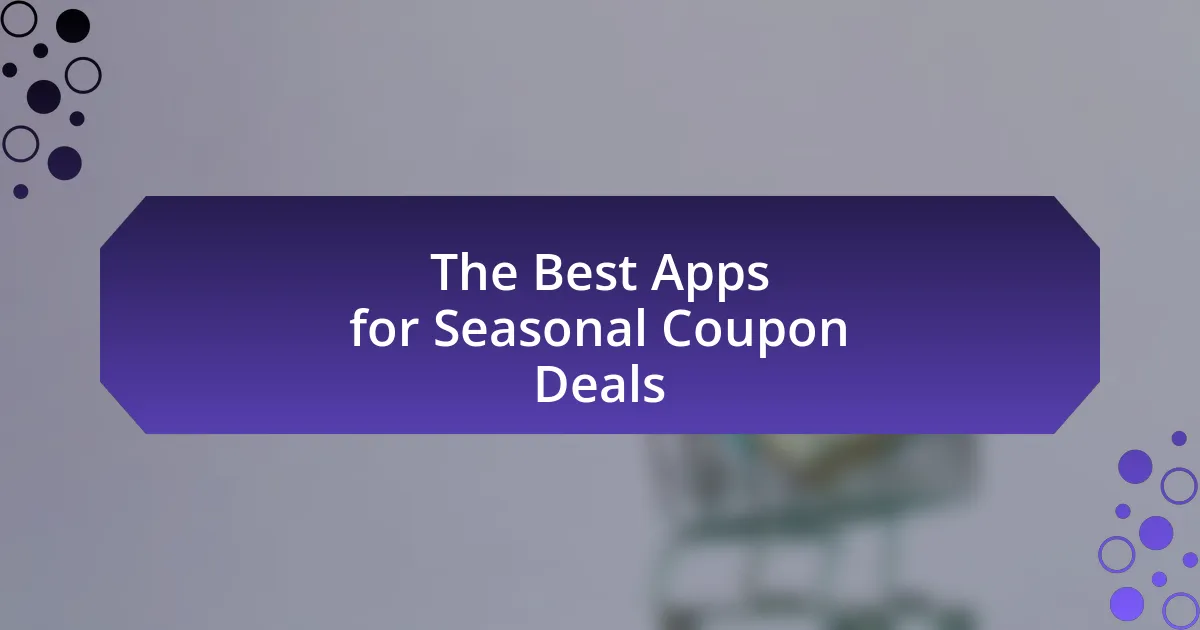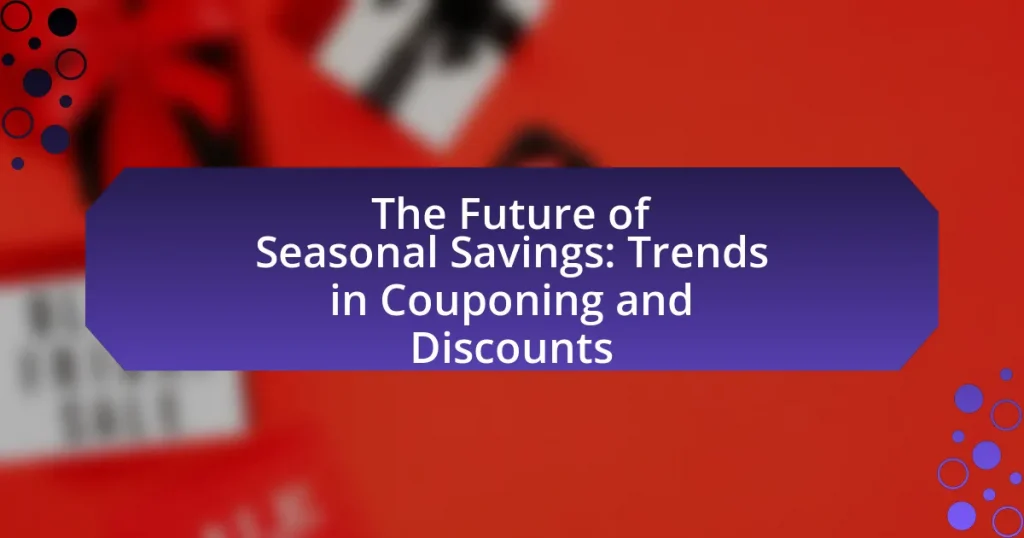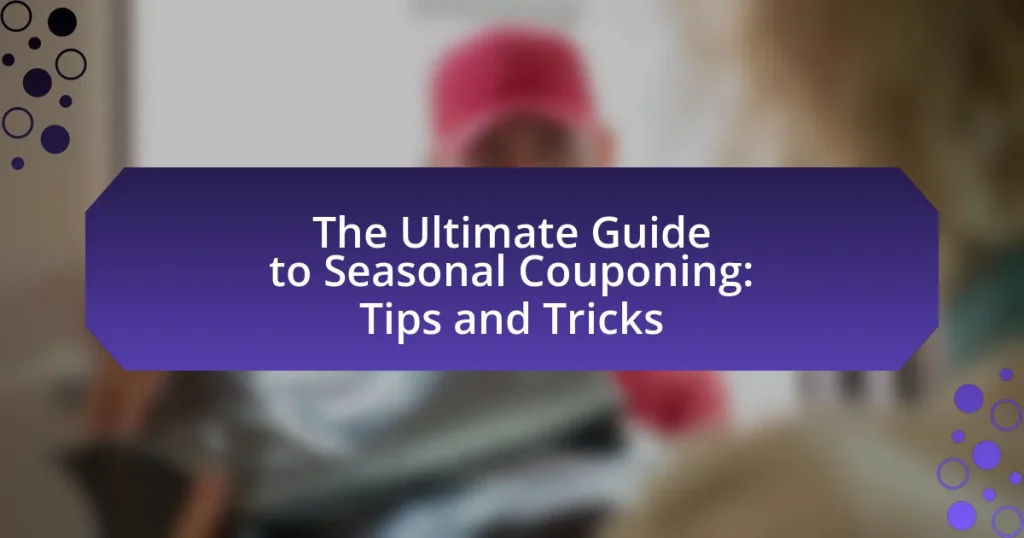The article focuses on the best apps for seasonal coupon deals, highlighting popular options such as Honey, RetailMeNot, and Rakuten. It explains how these apps assist users in saving money during seasonal sales by providing access to exclusive discounts, real-time notifications, and user-friendly interfaces. Key features that enhance their effectiveness include personalized offers, extensive coupon databases, and security measures to protect user data. The article also discusses the impact of user reviews on app popularity, the types of seasonal deals available, and best practices for maximizing savings through strategic coupon usage.

What are the Best Apps for Seasonal Coupon Deals?
The best apps for seasonal coupon deals include Honey, RetailMeNot, and Rakuten. Honey automatically finds and applies coupon codes at checkout for various online retailers, making it easy for users to save money during seasonal sales. RetailMeNot offers a wide range of coupons and cashback offers, particularly during holidays and special events, allowing users to maximize their savings. Rakuten provides cashback on purchases from numerous retailers, often featuring seasonal promotions that enhance savings opportunities. These apps are widely recognized for their effectiveness in helping consumers find and utilize seasonal discounts.
How do these apps help users save money during seasonal sales?
These apps help users save money during seasonal sales by providing access to exclusive discounts, coupons, and price comparison tools. For instance, many apps aggregate deals from various retailers, allowing users to find the best prices available during sales events. Additionally, some apps offer real-time notifications for price drops or special promotions, ensuring users do not miss out on significant savings. According to a study by RetailMeNot, 80% of consumers reported using coupon apps to save money during holiday sales, highlighting their effectiveness in maximizing savings.
What features make these apps effective for finding deals?
Effective apps for finding deals typically include features such as real-time notifications, user-friendly interfaces, and extensive databases of coupons and discounts. Real-time notifications alert users to new deals as they become available, ensuring they do not miss time-sensitive offers. User-friendly interfaces enhance the overall experience, making it easy for users to navigate and find relevant deals quickly. Extensive databases provide a wide range of coupons and discounts from various retailers, increasing the likelihood of finding valuable offers. These features collectively contribute to the effectiveness of deal-finding apps by maximizing user engagement and satisfaction.
How do user reviews influence the popularity of these apps?
User reviews significantly influence the popularity of apps by shaping potential users’ perceptions and decisions. Positive reviews enhance credibility and attract more downloads, as 79% of consumers trust online reviews as much as personal recommendations. Conversely, negative reviews can deter users, leading to decreased downloads and lower rankings in app stores. For instance, a study by BrightLocal found that 87% of consumers read online reviews for local businesses, indicating a similar trend for apps. Thus, user reviews serve as a critical factor in determining an app’s success in the competitive market of seasonal coupon deals.
What types of seasonal deals can users expect from these apps?
Users can expect various types of seasonal deals from coupon apps, including percentage discounts, buy-one-get-one-free offers, and limited-time promotions tied to holidays or events. For instance, during Black Friday, many apps provide significant discounts, often exceeding 50% off on popular items. Similarly, during back-to-school season, users may find exclusive deals on school supplies and clothing. These seasonal promotions are designed to attract consumers during peak shopping times, leveraging urgency and scarcity to encourage purchases.
Which holidays or seasons offer the best coupon opportunities?
Holidays and seasons that offer the best coupon opportunities include Black Friday, Cyber Monday, Christmas, and back-to-school season. Retailers typically provide significant discounts during these times to attract shoppers. For instance, Black Friday and Cyber Monday are known for deep discounts, with consumers spending over $9 billion online on Cyber Monday in 2021, according to Adobe Analytics. Similarly, during the back-to-school season, families spend an average of $849 on school-related items, prompting retailers to offer various coupons and promotions to capture this market.
How do apps curate seasonal deals for users?
Apps curate seasonal deals for users by analyzing user behavior, preferences, and seasonal trends to deliver personalized offers. They utilize algorithms that track purchasing patterns and engagement metrics, allowing them to identify which products are likely to be in demand during specific seasons. For instance, during the holiday season, apps may highlight discounts on gifts, decorations, and seasonal foods based on historical sales data and user interactions. This targeted approach is supported by data analytics, which shows that personalized marketing can increase conversion rates by up to 10 times compared to generic promotions.
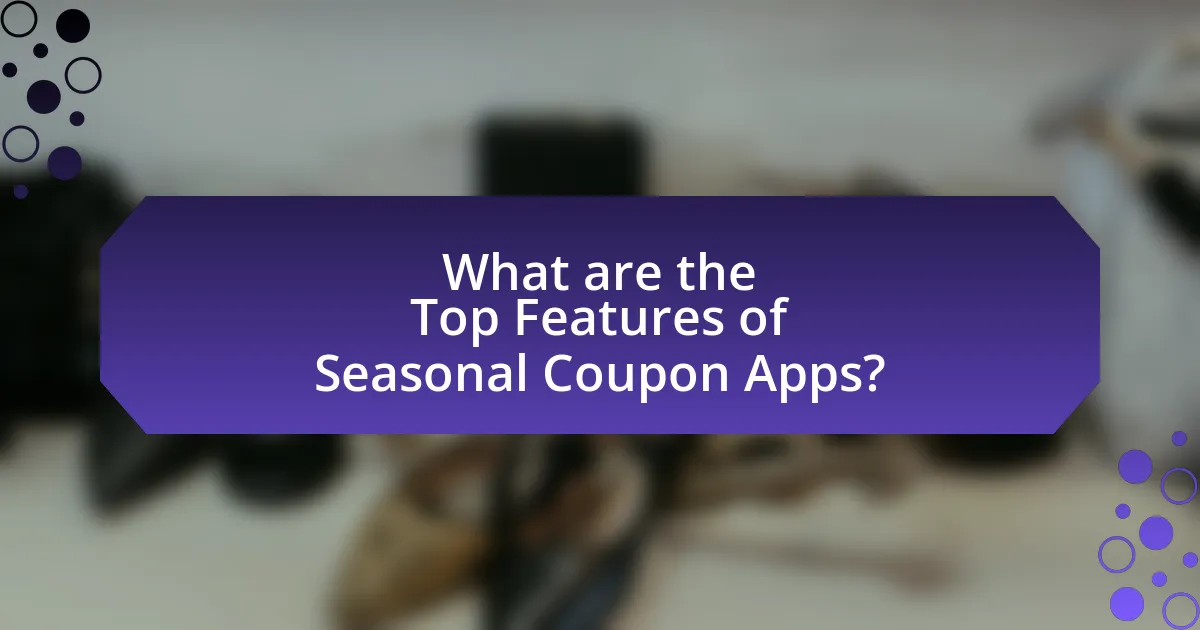
What are the Top Features of Seasonal Coupon Apps?
The top features of seasonal coupon apps include personalized offers, user-friendly interfaces, real-time notifications, and location-based deals. Personalized offers utilize user data to provide tailored discounts, enhancing user engagement and satisfaction. User-friendly interfaces ensure easy navigation, allowing users to quickly find and redeem coupons. Real-time notifications keep users informed about new deals and expiration dates, promoting timely usage. Location-based deals leverage GPS technology to deliver relevant offers based on the user’s current location, increasing the likelihood of in-store purchases. These features collectively enhance the user experience and drive sales during seasonal promotions.
How do user-friendly interfaces enhance the coupon hunting experience?
User-friendly interfaces significantly enhance the coupon hunting experience by simplifying navigation and improving accessibility. These interfaces allow users to quickly locate and apply coupons, reducing the time and effort required to find deals. For instance, apps with intuitive layouts and clear categorization enable users to filter coupons based on preferences, such as store or discount type, which streamlines the search process. Research indicates that 94% of first impressions relate to design, highlighting the importance of user-friendly interfaces in retaining user engagement and satisfaction. Consequently, a well-designed interface not only attracts users but also encourages them to utilize the app more frequently, ultimately leading to increased savings and a more enjoyable coupon hunting experience.
What role does personalization play in app effectiveness?
Personalization significantly enhances app effectiveness by tailoring user experiences to individual preferences and behaviors. This customization leads to increased user engagement, as studies show that personalized content can boost conversion rates by up to 202%. Furthermore, apps that utilize personalization strategies, such as targeted promotions and customized recommendations, often see higher retention rates, with users being 50% more likely to return to an app that meets their specific needs. Thus, personalization not only improves user satisfaction but also drives measurable business outcomes.
How do notifications and alerts improve user engagement?
Notifications and alerts significantly enhance user engagement by providing timely and relevant information that encourages interaction. These features keep users informed about new deals, reminders for coupon expirations, and personalized offers, which can lead to increased app usage and customer loyalty. Research indicates that apps utilizing push notifications see a 88% increase in engagement compared to those that do not, demonstrating the effectiveness of these tools in maintaining user interest and driving actions.
What security measures are in place to protect user data?
User data protection measures include encryption, secure access controls, and regular security audits. Encryption ensures that data is unreadable to unauthorized users, while secure access controls limit data access to authorized personnel only. Regular security audits help identify vulnerabilities and ensure compliance with data protection regulations, such as the General Data Protection Regulation (GDPR), which mandates strict data handling practices to safeguard user information.
How do apps ensure safe transactions for users?
Apps ensure safe transactions for users by implementing robust security measures such as encryption, secure payment gateways, and two-factor authentication. Encryption protects sensitive data by converting it into a secure format that can only be read by authorized parties, making it difficult for hackers to intercept information during transmission. Secure payment gateways facilitate transactions by acting as intermediaries that securely process payment information, reducing the risk of fraud. Two-factor authentication adds an extra layer of security by requiring users to verify their identity through a second method, such as a text message or authentication app, before completing a transaction. These combined measures significantly enhance the safety of user transactions within apps.
What privacy policies should users be aware of?
Users should be aware of privacy policies that outline data collection, usage, and sharing practices. These policies typically specify what personal information is collected, such as location data, purchase history, and contact details, and how this information is used to enhance user experience or for targeted advertising. Additionally, users should note whether their data is shared with third parties, including advertisers or partners, and the measures taken to protect their information. For instance, many apps comply with regulations like the General Data Protection Regulation (GDPR) or the California Consumer Privacy Act (CCPA), which mandate transparency in data handling and user consent. Understanding these policies helps users make informed decisions about their privacy and data security while using coupon apps.
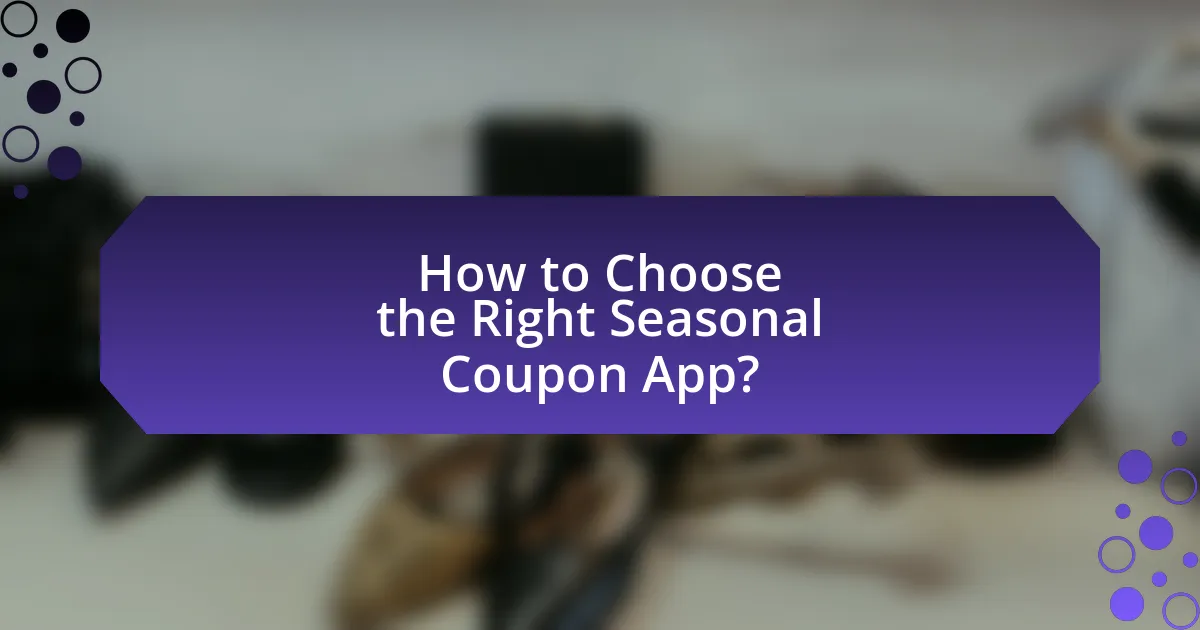
How to Choose the Right Seasonal Coupon App?
To choose the right seasonal coupon app, evaluate the app’s user interface, available deals, and user reviews. A user-friendly interface enhances navigation, while a wide range of seasonal deals ensures you find relevant discounts. Additionally, checking user reviews provides insights into the app’s reliability and effectiveness. For instance, apps like Honey and Rakuten are popular for their extensive coupon offerings and positive user feedback, indicating their reliability in delivering seasonal savings.
What criteria should users consider when selecting an app?
Users should consider functionality, user interface, reviews, security, and compatibility when selecting an app. Functionality ensures the app meets specific needs, such as offering seasonal coupon deals effectively. A user-friendly interface enhances the overall experience, making navigation intuitive. Reviews from other users provide insights into the app’s reliability and performance, while security features protect personal information. Compatibility with the user’s device and operating system is crucial for seamless operation. These criteria collectively help users make informed decisions about app selection, particularly in the context of finding the best apps for seasonal coupon deals.
How do compatibility and platform availability affect user choice?
Compatibility and platform availability significantly influence user choice by determining which devices and operating systems can access specific applications. Users are more likely to select apps that are compatible with their devices, as this ensures a seamless experience and functionality. For instance, a study by Statista in 2023 indicated that 75% of smartphone users prefer apps that are available on both iOS and Android platforms, highlighting the importance of cross-platform availability. Furthermore, if an app is not available on a user’s preferred platform, they may opt for alternative solutions that meet their needs, thereby impacting the app’s market reach and user adoption rates.
What are the pros and cons of free versus paid coupon apps?
Free coupon apps offer users the advantage of no upfront costs, allowing access to discounts without financial commitment. However, they may have limitations such as fewer deals, ads, and less customer support. In contrast, paid coupon apps typically provide a wider range of exclusive offers, enhanced features, and better user experience, but they require a financial investment. For example, a study by Statista in 2022 indicated that users of paid coupon apps reported a 30% higher satisfaction rate due to the quality of deals and user support compared to free app users. Thus, the choice between free and paid coupon apps depends on individual preferences for cost versus value.
What are some common pitfalls to avoid when using coupon apps?
Common pitfalls to avoid when using coupon apps include overlooking expiration dates, failing to read the terms and conditions, and not comparing prices. Expiration dates can lead to missed savings if users attempt to redeem expired coupons. Reading the terms and conditions is crucial, as some coupons may have restrictions that limit their use, such as minimum purchase requirements. Additionally, not comparing prices can result in spending more than necessary, as some items may be cheaper without a coupon at different retailers. These pitfalls can diminish the overall effectiveness of coupon apps and lead to wasted time and money.
How can users identify misleading deals or scams?
Users can identify misleading deals or scams by critically evaluating the offer’s legitimacy. Key indicators include checking for overly low prices that seem too good to be true, verifying the seller’s reputation through reviews and ratings, and ensuring that the website uses secure payment methods. According to the Federal Trade Commission, scams often involve high-pressure tactics and lack clear contact information, which are red flags for potential fraud. Additionally, users should be cautious of deals that require personal information upfront or promise unrealistic returns on investment.
What strategies can enhance the effectiveness of coupon usage?
To enhance the effectiveness of coupon usage, consumers should focus on strategic planning, such as timing their purchases during sales events and using apps that aggregate multiple offers. Research indicates that consumers who plan their shopping around promotional periods can save up to 30% more compared to those who shop without a strategy. Additionally, utilizing apps that provide real-time notifications for coupon availability and expiration can significantly increase the likelihood of redeeming offers before they expire, thus maximizing savings.
What are the best practices for maximizing savings with seasonal coupon apps?
To maximize savings with seasonal coupon apps, users should consistently check for new coupons, utilize app notifications, and combine coupons with sales. Regularly browsing the app ensures access to the latest deals, while enabling notifications alerts users to time-sensitive offers. Additionally, stacking coupons with ongoing promotions can lead to significant savings, as many retailers allow this practice. According to a study by RetailMeNot, consumers can save an average of 20% when combining coupons with sales, demonstrating the effectiveness of these strategies.
